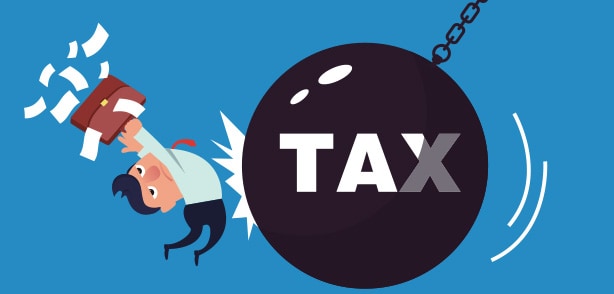Seven Easy Ways to Get into Trouble with the IRS

What's the most unfortunate part of making a mistake in filing your business taxes? Yes, an audit notice. In fact, being audited could make a week or two of jury duty seem attractive. (Even worse is the foolish move of not paying your taxes at all, but we'll get to that.)
Following are seven tax errors you'll want to avoid in 2025 — and beyond. There are others. But when you avoid these, in most cases, you'll stay on the right side of the IRS and the law.
1. Ignoring the difference between tax avoidance and tax evasion.
"Tax avoidance" means taking legal steps to reduce your tax bite — like working with a great accountant who's up to speed on current tax code. They can help your business take every possible deduction and reduce its taxes.
Tax evasion is an illegal way to pay lower taxes or no taxes at all, by withholding or providing false information to the IRS. Depending on the evidence, the IRS may consider this a civil or criminal act, per Title 26 of the Internal Revenue Code. The maximum fraud penalty for individuals is $100,000 and $500,000 for corporations. You could also be charged on multiple counts and/or see some jail time, depending on the severity of the fraud.
Don't believe us? Check out the IRS's list of 2024's Top 10 Fraud Cases. In 2023, a total of 363 individuals went to jail for tax evasion — and they still had to pay their original bills, plus interest, penalties, and legal fees.
2. Over-reporting business expenses to increase deductions.
Some entrepreneurs and/or their accountants may make some poor judgment calls on tax deductions — that's understandable. But others abuse the process by deducting dinners, lodging, gasoline, or other expenses that have nothing to do with their business activities. For example: if you claim you took 55 clients on weekend outings during 2024 in support of your at-home upholstery business, that will likely raise a flag.
3. Not reporting all forms of business revenue.
Despite the convenience of debit/credit cards and PayPal or Venmo, some business owners may solicit cash payments from their customers — then fail to report this income as part of their taxable revenue. They may also offer cash discounts, since they can't pay sales taxes on revenue they haven't claimed in the first place.
This problem is even present online, with documented transactions. Despite laws in 43 states (including parts of Alaska, and the District of Columbia) requiring vendors to collect and file sales taxes, even from out-of-state customers, many businesses fail to do so. If you have a digital storefront, consult with your accountant to determine your sales-tax collection responsibilities for Tax Year 2024.
4. Skipping payment of employer taxes.
Do you pay any of your employees off the books (a.k.a under the table)? Despite the IRS's best efforts, it's a rampant practice. In fact, a recent report found that in the construction alone, employers are paying between 1.1 million to 2.1 million workers off the books. Many people lose in this scenario, including those millions of employees who don't get essential protections, such as disability insurance and Social Security benefits. Businesses, meanwhile, risk fraud charges.
5. Mixing business and personal expenses in the same account.
Mixing business and personal expenses is a common abuse of tax laws, especially with sole proprietors who don't always understand the importance of maintaining separate personal and business bank accounts.
For example, you may legitimately use your car for both personal and business reasons. But if you co-mingle personal and business car-related expenses on the same card, you may run into costly problems. After all, how will you really know what's what come tax time, unless you've kept meticulous records? Why not save yourself a lot of stress and keep those expenses separate?
6. Misapplying the home-office deduction.
People working from home in a designated office space often over-inflate their IRS home-office allowance. For example, how can you truly figure out how much of your electricity your office space uses? Some tax advisors suggest not even taking the home-office deduction, since it practically invites IRS scrutiny.
7. Falling prey to the deception of "lifestyle creep."
Lifestyle creep is the fiscally irresponsible practice of classifying personal, non-essential expenses as deductions. Entrepreneurs may do this to convey a false idea of wealth and a prosperous business. Example: Driving a company-paid Maserati, collecting rare timepieces, and living in a totally mortgaged McMansion that you can't afford to furnish, when you barely broke even last year. This is a particularly unethical move for a business owner working with others' equity and/or supporting their employees' livelihoods.
Consult a financial professional for advice.
Accountants and tax lawyers are trained to recognize risky areas of tax law. Hiring one helps you avoid costly and time-consuming mistakes. But if you end up being audited, hiring a tax professional who advocates on your behalf can resolve the problem satisfactorily and at a lower cost.
Did you know?
Of the 64,124 cases reported to the Commission in fiscal year 2023,
85.6% of those convicted had little or no prior criminal history.
63.6% of business owners convicted of tax fraud were sentenced to prison.
The average sentence was 16 months.
Source: Quick Facts, by the United States Sentencing Commission.
Since 2008, Fora Financial has distributed $4 billion to 55,000 businesses. Click here or call (877) 419-3568 for more information on how Fora Financial's working capital solutions can help your business thrive.







